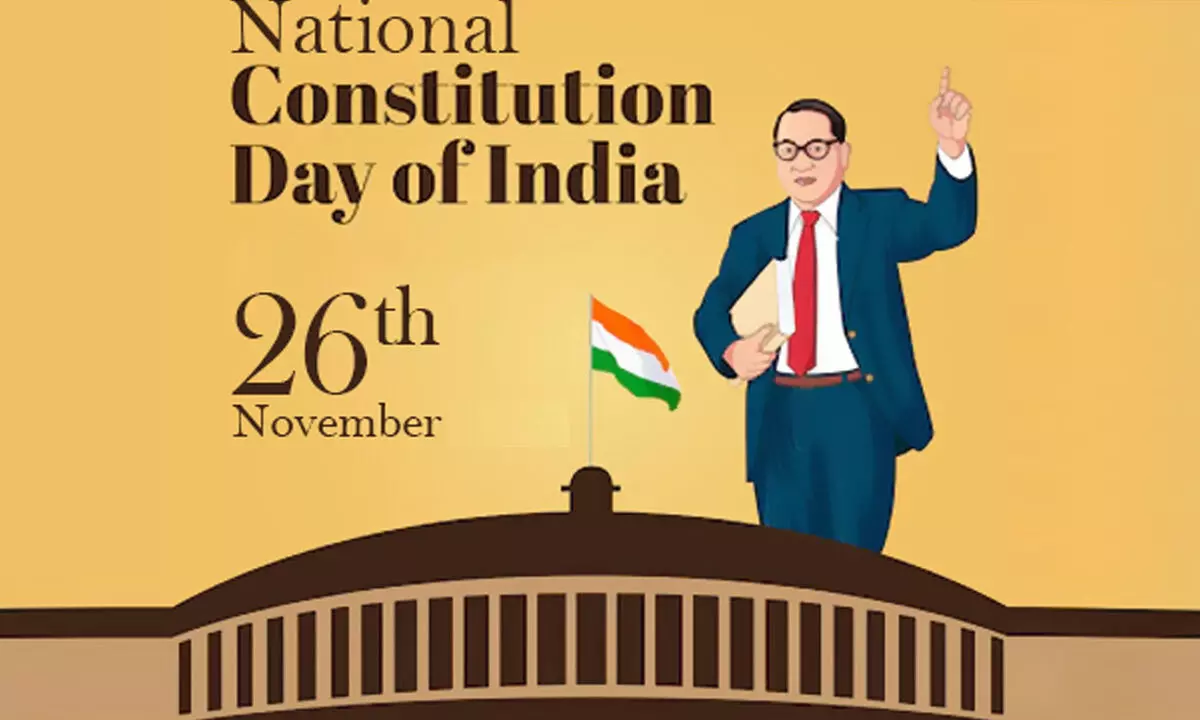


As India commemorates the 75th anniversary of its Constitution, President Droupadi Murmu will address a joint sitting of Parliament and release translated versions of the Constitution in Sanskrit and Maithili. Prime Minister Narendra Modi and other dignitaries will also attend the celebrations, together with the unveiling of a commemorative coin and stamp. The event coincides with the launch of a new website dedicated to engaging citizens with the legacy of the Constitution through interactive activities, and mass readings of the Preamble will be held nationwide. This is a significant day for India, as it honours the historic document that laid the foundation for its democracy.
Constitutional Day: Celebrating the Cornerstone of Indian Democracy
Background
Constitutional Day, celebrated on November 26th, holds immense significance for India as it commemorates the adoption of the Indian Constitution. This landmark document, which came into effect on January 26th, 1950, laid the foundation for India's democratic republic and enshrined the fundamental rights and duties of its citizens.
2023 Celebrations
This year, as India marks the 75th anniversary of its Constitution, elaborate celebrations are planned. Here are the key events:
Significance
The Indian Constitution is hailed as one of the most comprehensive and progressive constitutions in the world. It guarantees fundamental rights to all citizens, including equality before the law, freedom of speech and expression, and religious freedom. It also establishes a strong framework for a democratic and federal republic, with a clear separation of powers between the executive, legislative, and judiciary.
Top 5 FAQs
1. When was the Indian Constitution adopted? Answer: November 26th, 1949
2. Who chaired the Constituent Assembly that drafted the Constitution? Answer: Dr. B.R. Ambedkar
3. How many Articles are there in the Indian Constitution? Answer: 395 (as of 2023)
4. What is the Preamble of the Constitution? Answer: It is a statement of the Constitution's objectives and values, such as securing justice, equality, and liberty.
5. What are the fundamental rights guaranteed by the Constitution? Answer: Right to equality, right to freedom, right against exploitation, right to freedom of religion, and cultural and educational rights.
Conclusion
Constitutional Day is a testament to the enduring legacy of India's Constitution. Its ideals of democracy, justice, and equality continue to guide the nation and inspire countless citizens. By commemorating this historic milestone, India reaffirms its commitment to upholding the values enshrined in its founding document.

A school teacher and YouTuber from Nagpur, Rohit Arya, led a daring protest against the Maharashtra government for withholding his funds. In a shocking turn of events, he allegedly kidnapped 17 children and two others, and held them hostage inside a studio in Powai for six days. After failed negotiations, police forcefully entered the studio and rescued the children, while Arya was shot and later declared dead. In a video released before the children were rescued, Arya claimed he simply wanted to speak to certain people and had "moral demands" without specifying what they were.

Vice President J D Vance and Second Lady Usha Vance traveled to Camp Pendleton to attend a ceremony commemorating the 250th anniversary of the United States Marine Corps. The event serves as a reminder of the Marine Corps' long-standing role in American defense and global security, as well as honoring the sacrifices made by past and present Marines. This visit demonstrates the Trump administration's efforts to strengthen ties with the armed forces, with a particular focus on the highly respected Marine Corps.

Erika Kirk, wife of the late Turning Point USA founder Charlie Kirk, has started her campus tour at the University of Mississippi with Vice President JD Vance. They spoke at the "This Is the Turning Point" event, where Kirk shared her husband's message of reclaiming territory and standing up for truth in the face of tragedy. Vance also addressed hot-button issues such as immigration and the government shutdown, reiterating his role as vice president to prioritize the interests of the United States.

Delhi Minister Kapil Mishra spearheaded a high-level meeting to discuss the establishment of a new Gaushala in Ghumanheda village. The government's goal is to relocate stray cattle from urban streets while ensuring their well-being and sustainability through suggestions from NGOs and private organizations. This move marks a step towards animal welfare and environmental protection without financial assistance from the government.

After six years of imprisonment, Asaram Bapu has been granted interim bail on medical grounds due to his deteriorating health. The controversial self-proclaimed godman was arrested in 2013 for allegedly raping a schoolgirl and is now undergoing treatment at a private hospital. The decision was made by the Rajasthan High Court, with the Division Bench led by Acting Chief Justice Sanjeev Prakash Sharma. This comes after the Supreme Court had previously granted Asaram interim bail till the end of March for the same reason.

During a public meeting in Bihar, Union Home Minister Amit Shah dismissed any speculation about leadership changes by firmly stating that there is "no seat vacant" in politics. Praising Chief Minister Nitish Kumar and Prime Minister Narendra Modi, Shah urged the people of Bihar to vote for the NDA in the upcoming assembly elections. He also addressed various issues such as the construction of the Ram Temple and the ban on PFI, while emphasizing the NDA's strong leadership in the state.

Union Home Minister Amit Shah expressed his confidence that the BJP will emerge victorious in the upcoming assembly elections in West Bengal. He also criticized Chief Minister Mamata Banerjee and the ruling TMC for their opposition towards the special revision exercise for the voter list. The minister defended the legitimacy of the process and supported the Election Commission, while the opposition claims it is a ploy to manipulate voter lists before the polls.

Union Home Minister Amit Shah criticised the opposition's manifesto promise of providing government jobs in Bihar if they come into power. Calling it "nonsensical", Shah stated that such a promise is absurd and the opposition knows they will never come to power and will not have to fulfil any promises made. He also pointed out that the opposition's manifesto ignores the development strides made in Bihar, such as electricity and clean water reaching every village.

In an exclusive interview with News18 India, Union Home Minister Amit Shah dismissed Rahul Gandhi's allegations of "vote chori" (vote theft) and assured the people of Bihar that the BJP will take action against every single infiltrator in the country. He also addressed concerns about Nitish Kumar's health and stated that the Bihar CM was holding four rallies a day, proving that there was no question of his health being in poor shape. Additionally, Shah criticized the opposition's attempt to create a negative perception about Nitish Kumar.

In a recent interview with News18 India's "Sabse Bada Dangal Bihar 2025", Union Home Minister Amit Shah confidently stated that the NDA will form a government with an unprecedented two-thirds majority in the upcoming Bihar assembly elections. Shah also vehemently denied any concerns raised by the opposition regarding the health of Chief Minister Nitish Kumar, stating that both he and Kumar are holding four rallies a day. This marks a major shift in the political equation in Bihar, as the BJP and JD(U) are contesting an equal number of seats, a first in the state's electoral history.